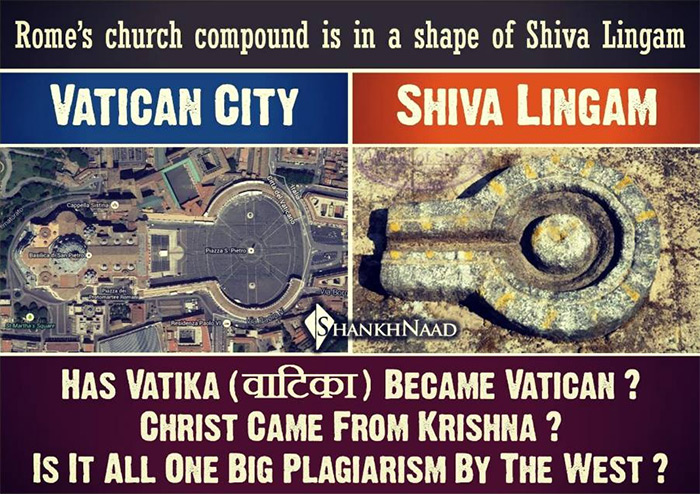Quite frequently, my mailbox is hit by yet another product of the PN Oak-type imagination. This one refers to a web article “Was the Christian Vatican Originally a Temple to Lord Shiva?”
It claims that “Rome’s church compound is in the shape of [a] Shiva Lingam”. It also suggests, citing as its source the “famous historian P.N. Oak”, that Vatican comes from Sanskrit vatika (“park, religious centre”), Christianity from Krishna-niti (“Krishna’s policy”, “the way of Krishna”), and Abraham from Brahma. Conclusion is that it’s all “plagiarism by the West”.
In fact, the shape of the church is standard, and therefore the claim implies that most classical churches, thousands of them, are really shaped like Shiva Lingams. If your eyes are very hazy, you might indeed get the impression of a similarity. This school is quickly satisfied with a merely semblance of similarity. Thus, a 3-shaped sign in the undeciphered Indus script is declared to be Om/Aum sign; as is a door ornament on the Red Fort, equally deemed to have been “originally a Hindu temple”. But even if a more perceptive look were to confirm this impression of similarity, it doesn’t prove a causal relation. The likeness between vatika and Vatican is claimed to “prove that the Vatican was a Hindu (Vedic) religious centre before its incumbent was forced to accept Christianity from 1st century AD”. No, this phrase merely shows the miserably low standards of proof applied by the Hindu history-rewriters. Also, no evidence is attempted, or known from elsewhere, for the momentous replacement or forcible conversion of this Vedic pontiff.
As for the etymologies, they are false. Vaticanus collis means “seers’ hill”, from vates meaning “seer, poet, inspired speaker”, related to the Germanic god-name Woden, meaning “fury, trance”. Christianity combines the Latin endings -(i)anus and –itas, meaning “follower of” and “the property/system/collectivity of”, with the Greek word Christos, “anointed””, as translation of the Biblical Hebrew word Mashiah, “anointed”crown-prince, messiah”. Ab-raham is Hebrew and means “father of many ”, while Brahma originally means “great, growth”, related to Germanic berg, “mountain”. These Biblical words have nothing to do with their Sanskrit look-alikes.
Further, it claims that Amen really comes from Om/Aum. Amen is Hebrew for “certainly, reliably”, and has nothing to do with Om/Aum. For that matter, the frequent assertion in some yogic circles that Latin omnis, “all”, is also related, is equally untrue. Omnis is a phonetic adaptation from op-nis, with the root op-, “many”, related to the Latin-derived word opulence. The word amen is cognate to Arabic ‘amin, which also means “certain”. A well-known Urdu word derived from it is mo’min, “one who takes as certain”, “believer”, hence “Muslim”. So according to these history-rewriters, a Muslim really is an “Om-sayer”!
It further claims that “all religions are one and are derived from Vedic Sanatana Dharma” and that “both Christianity and Islam originated as distortions of Vedic beliefs”. This is flatly untrue, but nonetheless Padres and Mullahs will welcome it if it helps in reconciling Hindu parents to their daughter’s elopement with a Christian or Muslim and conversion to his religion: “Hey, mom and dad, don’t worry, it’s only a variation on the Vedic religion, as you yourselves always say!”
So, the very numerous PN Oak-party among the Hindus is not only an endless source of laughter for all enemies of Hinduism. It is also a useful fifth column within the crumbling fortress of Indian Paganism. For the sake of Hindu survival, it is vital that real history gets restored: against the secular anti-Hindu version, but also against the Hindu caricature.
































